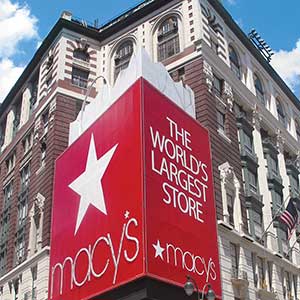
While every facet of retail is being hard-hit by the COVID-19 pandemic, which has forced store closures across the country, major department stores are confronting mounting financial woes.
Macy’s, the largest department store chain in the United States, with 775 locations including Bloomingdale’s and Bluemercury stores, has furloughed most of its 125,000 employees—and has laid off roughly 2,000—since the pandemic began. In a statement released to investors Monday, the company said it has “lost the majority of our sales due to the store closures” and noted that the pandemic has taken a “heavy toll” on the business.
Macy’s is trying to rustle up new capital and has hired investment bank Lazard and law firm Kirkland & Ellis to help with that search, CNBC reports.
Neiman Marcus Group, owner of Neiman Marcus and Bergdorf Goodman stores, is allegedly making plans to seek bankruptcy protection as soon as this week, Reuters and other major media outlets are reporting. The upscale department store, which was founded in 1907 in Dallas and debuted a splashy flagship store in the Hudson Yards development in New York City in 2019, has been forced to temporarily shut 43 of its locations, around two dozen Last Call stores, and its two Bergdorf Goodman stores in New York City. The company has furloughed many of its approximately 14,000 employees.
Neiman Marcus Group is in the final stages of negotiating a loan with its creditors that totals “hundreds of millions of dollars, which would sustain some of its operations during bankruptcy proceedings,” according to Reuters. The company skipped millions of dollars in debt payments last week. It has until the middle of May to make the interest payment—after that, it will likely be pushed into bankruptcy court by its bondholders, which could be step one in its plan to restructure.
Ailing J.C. Penney announced Wednesday that it also skipped its big mid-April interest payment, a roughly $12 million interest payment. The retailer has now entered a 30-day grace period to evaluate its options, which are narrowing.
Nordstrom leveraged its real estate holdings earlier this month to raise $600 million in emergency funds, inching the Seattle-based department store away from the cliff of real financial disaster—though continued closures could put the company on the edge again.
Do American department stores have the ability to withstand the devastating economic impacts of the pandemic? Experts agree that the length of the closures—which were instituted to help stop the spread of the deadly coronavirus—may dictate which retailers will make it through.
Investment analysis firm Cowen said today that Nordstrom can withstand a year of store closures, but that Macy’s has approximately four months, Kohl’s Corp. has six months, and J.C. Penney has about seven months.
Top: Macy’s at Herald Square in New York City (photo courtesy of Macy’s)
Follow me on Instagram: @emilivesilind
- Subscribe to the JCK News Daily
- Subscribe to the JCK Special Report
- Follow JCK on Instagram: @jckmagazine
- Follow JCK on X: @jckmagazine
- Follow JCK on Facebook: @jckmagazine